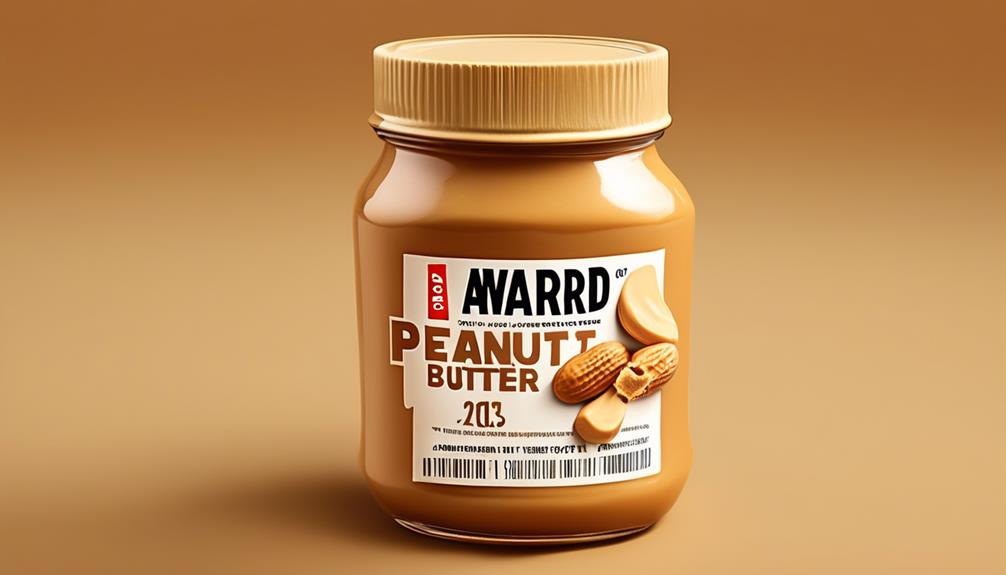We all enjoy the smooth, nutty deliciousness of peanut butter, but have you ever noticed that it can occasionally make your stomach feel less than great? There could be several reasons behind this discomfort.
From potential food sensitivities to the high-fat content of peanut butter, there are various factors that might be causing your stomach distress. But fear not, as we're about to uncover the mystery behind why peanut butter hurts your stomach.
Key Takeaways
- Peanut butter sensitivity and intolerance can cause symptoms such as stomach pain, cramps, bloating, nausea, diarrhea, and eczema or itchy skin.
- Peanut allergies can also cause discomfort and pain, and may require avoiding peanuts altogether.
- Dietary alternatives to peanut butter, such as almond butter, sunflower seed butter, and soy nut butter, can be nutritious substitutes.
- It is important to identify trigger foods, read food labels, and inform food establishments about the sensitivity to effectively manage peanut butter-related digestive discomfort and allergies.
Peanut Butter Sensitivity
If you experience stomach pain, cramps, bloating, nausea, or diarrhea after consuming peanut butter, you may be sensitive to it. These tummy troubles can be quite uncomfortable and may indicate a sensitivity to peanut butter. This sensitivity can be triggered by direct consumption of peanut butter or even through inhalation or cross-contamination.
It's important to be mindful of these symptoms and consider seeking medical advice to properly manage peanut butter sensitivity.
When dealing with peanut butter sensitivity, it's essential to consider alternatives for healthy fats and protein. Reading food labels carefully and informing food establishments about the sensitivity can also help in managing this issue. Consulting a healthcare professional for a proper diagnosis is crucial. Allergy testing may be necessary, and following the recommended treatment plan provided by the doctor is important for effectively managing peanut butter sensitivity.
It's also important to note that digestive issues can arise from eating too much peanut butter due to its high-fat content. Some individuals may have a food sensitivity to components found in peanut butter, which can lead to stomach discomfort and bloating. Understanding the difference between food intolerance and food allergy is crucial for proper management, as diarrhea from eating peanuts doesn't necessarily indicate a peanut allergy.
Symptoms of Peanut Intolerance

Individuals with peanut intolerance may experience a range of symptoms, including bloating, stomach pain or cramps, nausea, diarrhea, and eczema or itchy skin. These symptoms can vary in severity and may appear shortly after consuming peanuts or peanut products.
Bloating and stomach pain often occur due to the body's inability to properly digest peanuts, leading to discomfort and abdominal distention. Nausea and diarrhea can result from the body's immune response to the peanuts, causing inflammation in the gastrointestinal tract. In some cases, individuals with peanut intolerance may also experience skin-related symptoms such as eczema or itching, which can be attributed to an allergic reaction triggered by the ingestion of peanuts.
It's important to note that these symptoms persist for individuals with peanut intolerance, and they may worsen with continued consumption of peanuts. If you suspect that you have a peanut intolerance, it's essential to consult a healthcare professional for proper evaluation and diagnosis. Identifying and managing peanut intolerance can help alleviate these uncomfortable symptoms and prevent potential complications.
Managing Peanut Sensitivity

As we navigate the challenges of managing peanut sensitivity, it's crucial to identify trigger foods and keep a detailed food diary to track reactions.
Reading food labels diligently is essential to avoid hidden sources of peanuts and related ingredients that may cause discomfort.
Exploring alternative protein sources and informing food establishments about our peanut sensitivity can also help us make informed dietary choices and prevent any potential reactions.
Peanut Allergy Symptoms
Managing peanut sensitivity requires careful monitoring of food intake and consulting with a healthcare professional, as symptoms can be triggered by various means and may necessitate avoiding peanuts and reading food labels carefully.
Peanut sensitivity symptoms are less severe than allergy symptoms but can still cause discomfort and pain.
Triggers for peanut sensitivity include inhalation, direct contact, and cross-contamination, leading to immediate allergic reactions and anaphylaxis.
Management may require the use of an EpiPen or emergency medical care in severe cases.
Delayed response to peanut sensitivity can make it difficult to identify trigger foods, necessitating careful monitoring of food intake and consultation with a healthcare professional.
Symptoms of peanut intolerance include bloating, stomach pain, nausea, diarrhea, eczema/itchy skin, and tiredness, which may require avoiding peanuts and reading food labels carefully.
Dietary Alternatives
When managing peanut sensitivity, it's helpful to explore dietary alternatives that provide healthy fats and protein while avoiding potential triggers.
One option is almond butter, which is a nutritious alternative to peanut butter and is widely available.
Sunflower seed butter is another excellent choice, offering a similar texture and taste without the risk of an allergic reaction.
For those who enjoy a creamy spread, consider trying soy nut butter.
It's important to read food labels carefully and avoid products that contain peanuts or traces of them.
Additionally, it's crucial to inform restaurants and food establishments about the sensitivity to ensure a safe dining experience.
Eating Too Much Peanut Butter

Consuming excessive amounts of peanut butter can lead to stomach discomfort and bloating due to its high-fat content. It's important to be mindful of our intake, as overindulging in this delicious spread can lead to some unpleasant symptoms. Here are some important points to consider:
- Some individuals may experience intolerance symptoms due to their sensitivity to salicylates and amines found in peanut butter.
- To alleviate bloating, it's important to drink plenty of fluids and explore potential food sensitivities.
- If peanut butter consistently causes tummy troubles, it's recommended to consult a doctor or dietitian to identify any underlying issues.
- Inadequate water intake while consuming fiber-filled foods like peanut butter can lead to constipation, so it's important to stay hydrated.
- Moderation is key when enjoying peanut butter, as excessive consumption can lead to discomfort and digestive issues.
Being mindful of our peanut butter intake and paying attention to how our bodies react can help us enjoy this tasty treat without the unwanted side effects.
Stomach Ache From Peanut Butter

Excessive consumption of peanut butter, as discussed previously, can lead to stomach discomfort and bloating due to its high-fat content, and may also result in stomach aches for individuals with peanut sensitivity.
When peanut butter is consumed, it travels through the digestive system, and for those with peanut sensitivity, it can trigger adverse reactions. This can lead to stomach ache from peanut butter, along with symptoms such as cramps, bloating, nausea, and diarrhea.
It's important to note that symptoms of peanut sensitivity may not always manifest immediately, making it challenging to identify the trigger food. If you experience stomach ache from peanut butter, it's advisable to seek medical advice. Healthcare professionals can conduct allergy testing, discuss your symptoms and medical history, and provide guidance on managing peanut sensitivity.
Taking proactive measures such as reading food labels carefully, considering alternatives to peanuts, and carrying emergency medication if necessary, can contribute to managing stomach ache from peanut butter and minimizing discomfort associated with peanut sensitivity.
Peanut Butter and Digestive Issues

We need to consider how digestive enzymes can affect our ability to digest peanut butter.
Allergies can play a significant role in our digestion and cause discomfort after consuming peanut butter.
It's important to explore alternative nut butter options to find a suitable and easily digestible alternative.
Digestive Enzymes and Peanut Butter
If you experience digestive discomfort after consuming peanut butter, understanding the role of digestive enzymes in the body can provide valuable insights into these issues.
When it comes to peanut butter and digestive enzymes, here are some key points to consider:
- Lipase: This enzyme helps break down the fats in peanut butter, but some individuals may have difficulty producing enough lipase, leading to digestive discomfort.
- Protein Digestion: Peanut butter contains protein, and the enzyme pepsin aids in its breakdown. Inadequate pepsin levels can cause issues with protein digestion.
- Carbohydrate Digestion: Amylase is essential for carbohydrate digestion, and its deficiency may lead to bloating and gas after consuming peanut butter.
- Gastric Acid: Adequate levels of gastric acid are crucial for the digestion of peanut butter, and low levels may result in discomfort.
- Consultation: If digestive issues persist, consulting a healthcare professional can help identify any underlying conditions or intolerances related to peanut butter consumption.
Allergies and Digestion
Understanding the potential link between peanut sensitivity and digestive discomfort, particularly in relation to allergic reactions, is crucial for identifying and managing these issues. Peanut butter, in particular, can trigger allergic symptoms such as hives, itching, swelling, and in severe cases, anaphylaxis. These allergy symptoms can also extend to the digestive system, causing stomach pain, cramps, nausea, vomiting, or diarrhea.
It's important to note that peanut sensitivity and intolerance can also manifest as digestive issues, including bloating, indigestion, and discomfort. If you experience consistent digestive problems after consuming peanut butter, it's advisable to consult a healthcare professional to determine if an allergy or sensitivity is the cause.
Identifying the trigger food, whether it's peanuts or other components in the peanut butter, is crucial for managing digestive discomfort and ensuring overall well-being.
Nut Butter Alternatives
Exploring alternative nut butter options such as almond, cashew, or sunflower seed butter can help alleviate digestive discomfort associated with peanut sensitivity. When considering nut butter alternatives, here are some practical tips to keep in mind:
- Experiment with powdered peanut butter as a lower fat, calorie, and sodium alternative to traditional peanut butter.
- Opt for no-sugar-added nut butter options to prevent blood sugar imbalances and weight gain.
- Use nut butter alternatives to manage bloating, stomach pain, and nausea associated with peanut intolerance.
- Consult a healthcare professional to discuss symptoms, undergo allergy testing, and seek personalized advice for managing digestive issues related to peanut butter.
Peanut Butter for Acid Reflux

For individuals experiencing acid reflux, consuming peanut butter may exacerbate symptoms and lead to stomach discomfort. While peanut butter is a good source of healthy fats, it can also be problematic for those with acid reflux. The high fat content in peanut butter can cause the lower esophageal sphincter (LES) to relax, allowing stomach acid to flow back into the esophagus and worsen reflux symptoms.
| Peanut Butter and Acid Reflux | Effects | Recommendation |
|---|---|---|
| High Fat Content | Causes LES to relax | Choose natural, low-fat peanut butter options |
| Potential Trigger | Exacerbates reflux symptoms | Monitor portion sizes and consumption frequency |
| Individual Sensitivity | May vary depending on the person | Consider keeping a food diary to track symptoms |
It's essential to be mindful of portion sizes and consider choosing natural, low-fat peanut butter options to minimize the impact on acid reflux. Additionally, individuals with Celiac Disease should ensure that the peanut butter they consume is gluten-free to avoid any adverse effects. It's important to consult with a healthcare professional for personalized advice on managing acid reflux and dietary choices.
Benefits of Peanut Butter

Peanut butter offers a range of health benefits, making it a valuable addition to a balanced diet. Here are some reasons why peanut butter is beneficial for your health:
- Nutrient-rich: Peanut butter is a good source of protein, healthy fats, vitamins, and minerals, supporting muscle repair and overall health.
- Satiety and portion control: Its high healthy fat content can provide a feeling of fullness, aiding in portion control and weight management.
- Heart-healthy: Contains healthy unsaturated fats and high fiber content, which may help lower the risk of heart disease.
- Versatile: Can be enjoyed in various ways, such as in smoothies, as a spread, or as a dip, making it a versatile and convenient food option.
- Potential skin benefits: While individual responses may vary, some people may find that peanut butter contributes to healthy skin due to its nutrient content.
These benefits make peanut butter a valuable addition to one's diet, providing a range of essential nutrients and potential health advantages.
Frequently Asked Questions
Why Does My Stomach Hurt After Eating Peanut Butter?
We understand that stomach discomfort after eating peanut butter can be frustrating.
It's important to note that our bodies can react to peanut butter due to its high-fat content, leading to indigestion and bloating.
Additionally, some individuals may experience discomfort due to food sensitivities.
Monitoring portion sizes and considering alternatives can help manage these symptoms.
If the discomfort persists, seeking medical advice for proper diagnosis and treatment is crucial.
Is Peanut Butter Hard in the Stomach?
Yes, peanut butter can be hard on the stomach for some people. Its high-fat content can lead to discomfort, bloating, and indigestion.
Additionally, individuals with a food sensitivity to salicylates and amines found in peanut butter may experience stomach pain.
It's important to be mindful of our body's response to foods and consider alternatives for healthy fats and proteins.
If symptoms persist, consulting a healthcare professional is recommended for personalized advice.
What Are Symptoms of Peanut Butter Intolerance?
Peanut butter intolerance might cause symptoms like bloating, stomach pain, nausea, diarrhea, and itchy skin. It can be tricky to identify the trigger food since symptoms may not appear immediately.
Managing peanut sensitivity involves reading labels, considering alternatives, and informing others. Seeking medical advice, allergy testing, and following a treatment plan are important.
Digestive issues from peanut butter might be due to its high-fat content or individual digestive systems.
How Do You Get Rid of a Peanut Allergy Stomach Ache?
We manage a peanut allergy stomach ache by:
- Avoiding peanuts
- Reading food labels
- Carrying emergency medication
Seeking medical advice, consulting healthcare professionals, and undergoing allergy testing are crucial.
It's essential to carefully monitor food intake due to the delayed response to peanut sensitivity. Symptoms include bloating, stomach pain, nausea, diarrhea, and tiredness.
Managing peanut sensitivity involves close attention to food choices and being proactive in seeking professional guidance for proper diagnosis and treatment.
Conclusion
In conclusion, it's important to be mindful of how our bodies react to certain foods. If peanut butter doesn't agree with us, it's best to listen to our stomachs and consider alternative options.
It's all about finding what works best for our individual digestive systems. So, next time we reach for the peanut butter, we'll remember to tune in to our body's signals and make the best choice for our health.









